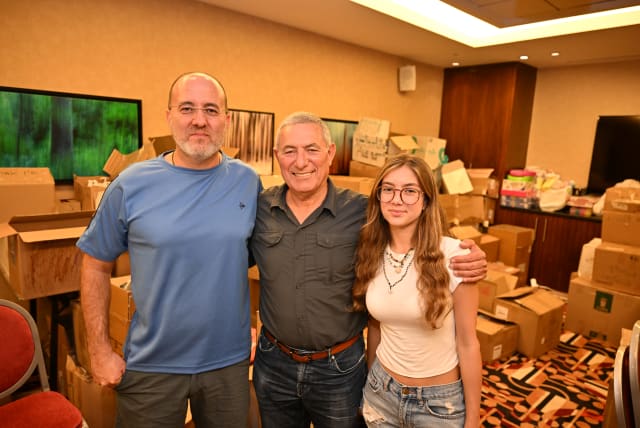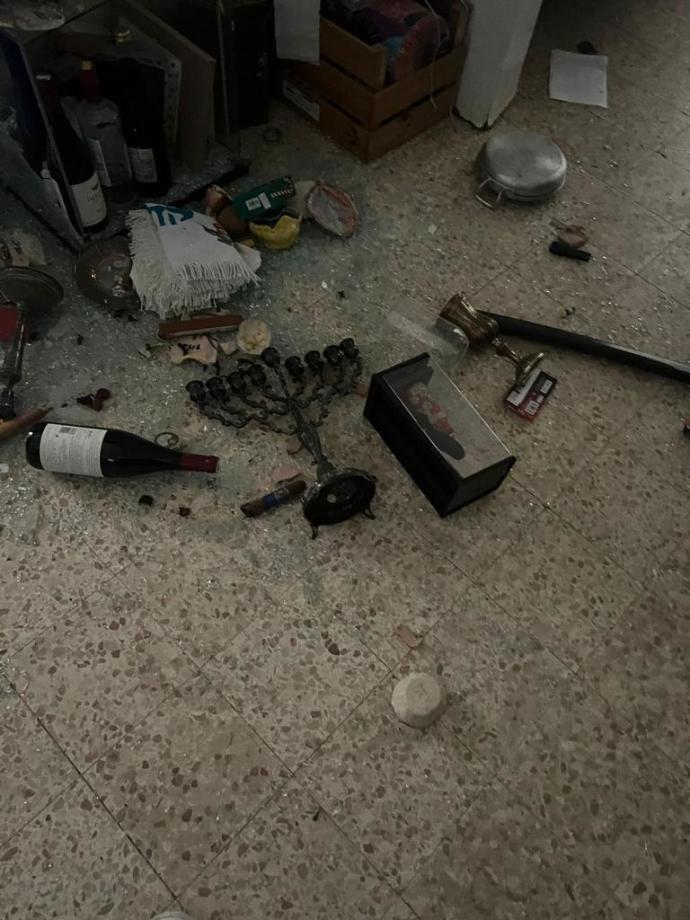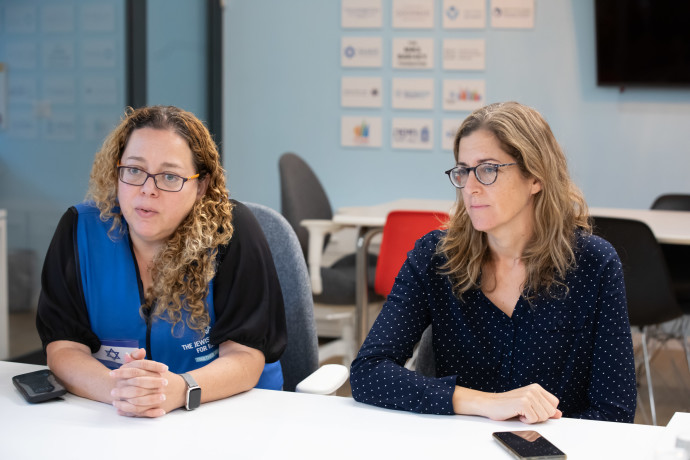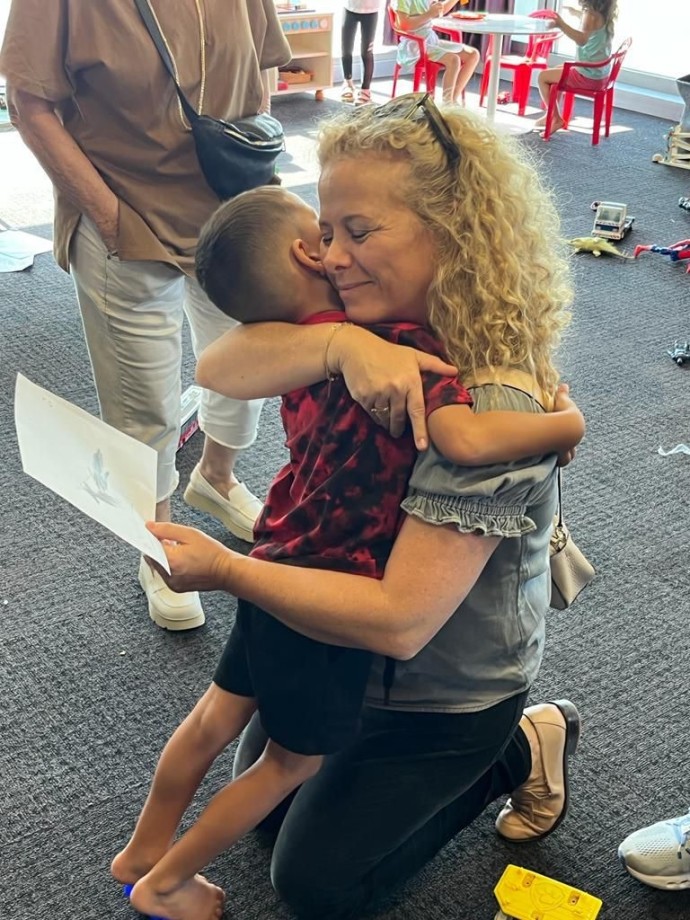Providing Relief When Terror Victims Need It Most

The Jewish Agency for Israel’s Fund for Victims of Terror provides those who have encountered the horrors of terrorism with crucial financial assistance as they navigate their new reality.
Instead of sleeping in after a night of prayer and celebration in honor of Simchat Torah, Israel was jarred awake by red alert sirens across the country on the morning of October 7.
But for many, the sirens were just the beginning of their nightmare.
“It all started at 6:30 a.m. on Saturday morning. My daughter was at a friend’s house and called us from the road to say she was making her way back home when suddenly, an IED landed right next to her car,” Rami Bar-Gil recalled.
“She immediately got out of the car and ran for shelter. I got up in a panic and raced over in my car to pick her up, but when I got to her we couldn’t leave the shelter because of the rain of the rockets. While we were in the shelter, we started hearing gunshots and that’s when we realized that there were terrorists in the kibbutz.”
Finally, when they were able to get back home, they broke the handle to their shelter so terrorists couldn’t get inside. Next door, an RPG struck a home causing the whole block to shake.
Security forces were not able to rescue the family until 5 p.m.
“When we saw the security forces, it felt like we saw angels in white taking us out of this hell. And it was hell.
Everything was burned, dead bodies on the side of the road. The most innocent things like children’s toys thrown on the floor in disarray. Like in a movie about an atomic bomb,” Bar-Gil said.
Once the adrenaline subsided for the family, the grief surrounding their new reality began. News of loved ones who had been murdered spread across the kibbutz, a small agricultural community, and the family members are now among the 200,000 from the North and South who are currently displaced.
As such, the Bar-Gil family has received aid from The Jewish Agency’s Fund for Victims of Terror.
The fund for Victims of Terror, which was created in 2002, is largely funded by The Jewish Agency’s two major partners, Jewish Federations of North America and Keren Hayesod.
To date, the fund has supported some 5,900 families where someone was killed or injured in a terror attack or had their home destroyed by rocket fire. Fund grants will also be made available to families of those held hostage by Hamas – some 240 people from around the world whose fate currently hangs in the balance. These emergency grants include funding to any victim of terror, including non-Israeli citizens, who have been impacted by acts of terror.
Currently, every single individual who suffers either injuries or property damage in a terror attack receives a $1,000 check from the fund for immediate needs. The fund also provides long-term rehabilitation grants in the amount of $6,300 per person for up to three years as well as ongoing support to the victims as they navigate the days after an attack.
“After the darkest day in Jewish history since the Holocaust, the sense of loss and the emotional toll across Israel are unimaginable,” said Mark Wilf, Chairman of The Jewish Agency’s Board of Governors. “In the wake of the unprecedentedly brutal Hamas attacks, immediate financial aid for the victims and support for their long-term recovery process are both essential components of making the people of Israel – and all of the Jewish people – whole again.”
While the expenses many families have to start anew will be exorbitant, this fund allows many who left their homes with literally just the clothes on their backs some immediate relief, without any red tape.
“When I meet with victims, I always say I’m the hand that gives a hug from the Jewish communities around the world,” said Ayelet Nahmias-Verbin, Chairperson of The Jewish Agency’s Fund of Victims of Terror and the organization’s online resource center for community resilience. “On October 8th, we decided every dollar needed to be paperless. We didn’t want anybody suffering to have to deal with bureaucracy for this small, but meaningful financial relief.”
The fund, Nahmias-Verbin said, is more than just monetary support, it also provides emotional support because it represents the “love and solidarity of the Jewish community in the world.”
She added, though, that she understands the fund has its limitations and The Jewish Agency is working hard to expand the initiative in the face of such unexpected and overwhelming tragedy.
“This fund started off as a rehabilitation fund to help victims of terror,” she said, noting that Israelis know how to emotionally and logistically prepare for those hurt by fallen shrapnel from a missile, a stabbing attack, and even bombings from the intifada.
Nothing could quite prepare Jewish Agency staffers for the avalanche of grief that arose in the aftermath of the deadliest attack on Jews since the Holocaust.
“Since establishing JReady during the Covid-19 pandemic, The Jewish Agency learned how to leverage and maximize the support of Jewish communities around the world,” she said. “We know what resilience looks like. But this current crisis is unprecedented. We’ve never been in a situation where we’re sitting with families who have gone through a personal Holocaust, who experienced a national genocide.”
Her team has been working around the clock to uncover the names of those in need and make sure everyone entitled to funds receives them. Since October 7, 6,000 families have received the fund and The Jewish Agency is looking into allocating additional funds for families that have more than one victim.
“There are many issues that will have to be addressed. That’s why we’re raising all these resources,” she said. “This fund will be needed for short and long-term purposes.”
As for Nahmias-Verbin herself, she spends most of her day in the field meeting with communities. She has heard their stories and absorbed their grief.
“When I close my eyes at night, I see Be’eri. I see Kfar Aza. I see Ofakim. I see Sderot,” she said. “I don’t need to look at the images on the news, I know what they went through and many of us will never be the same.”
And yet, many of these families have exhibited enormous strength and are already thinking about what’s next.Bar-Gil who is now staying in a hotel in Eilat is focused on rebuilding even though the task seems daunting.
“I have no idea what will happen now. How do we restore our lives, the kibbutz? We will have to start all over. To support the children, the women, and the older residents who experienced a second Holocaust in their lives. And we will need all of the Jewish people’s help to do this,” he said.
Nahmias-Verbin has communicated these worries to her partners in Jewish communities and says she remains grateful for “their interest and engagement and involvement. These communities have always been there for us and I’m so appreciative of what they’re doing for us. We’re going to need their support even more like we never needed it before.”
This article was written in cooperation with The Jewish Agency.
Jerusalem Post Store
`; document.getElementById("linkPremium").innerHTML = cont; var divWithLink = document.getElementById("premium-link"); if (divWithLink !== null && divWithLink !== 'undefined') { divWithLink.style.border = "solid 1px #cb0f3e"; divWithLink.style.textAlign = "center"; divWithLink.style.marginBottom = "15px"; divWithLink.style.marginTop = "15px"; divWithLink.style.width = "100%"; divWithLink.style.backgroundColor = "#122952"; divWithLink.style.color = "#ffffff"; divWithLink.style.lineHeight = "1.5"; } } (function (v, i) { });



